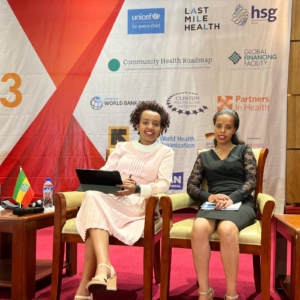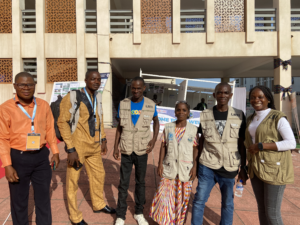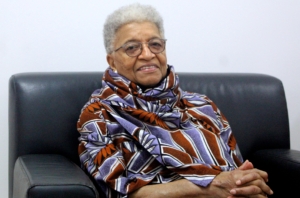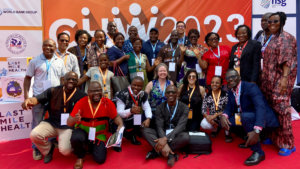In March, the Liberia Ministry of Health hosted the 3rd International Community Health Workers Symposium. More than 700 attendees from 46 countries gathered for plenaries, panels, workshops, and engaged conversations on the future of community health.
Last Mile Health was proud to partner with the Liberia Ministry of Health to host the symposium. After months of preparation, members of the Ethiopia, Liberia, Malawi, and Sierra Leone teams, as well as global team members from Uganda and the United States, gathered alongside our partners in this global movement to advance community health in pursuit of health for all.
Here are some key takeaways from the symposium:

Dr. Ruth Negate Belachew, Chief of Staff, Ethiopia Ministry of Health, and Meskele Gelashe, Ethiopian health extension worker, on stage at the Symposium.
CHWs in the room and on the stage
Community health workers (CHWs) from more than 20 countries and from every county in Liberia attended the Symposium. Importantly, they led the conversation, speaking on nearly every panel and plenary during the five-day event. They called for salaries for all CHWs, for adequate equipment and consistent supplies, for program sustainability, and for women’s leadership at all levels.
Malawian CHW Dickson Mbewe said, “My call to action to leaders is this: you need us, you can’t deliver healthcare without us, so move with the world and pay us, recognize us and value us!”
Ethiopian CHW Meskele Gelashe shared, “The message I have is to make all CHWs salaried staff.”
Mark-Pay Kaiyuway, a Liberian CHW from Grand Bassa County, delivered this message: “We are treating children under five. We are connecting pregnant women to the health clinic. I have come here to say that we are not done. We are asking the partners that are here to support CHW programs. And we thank you.”
The evolution of Liberia’s exemplary community health program

Community Health Focal Point Samuel P. Goaneh, Community Health Services Supervisor Denkins C. Deah, Community Health Assistants Joseph P. Willie, Mary N. Wiah, and Mark-Pay Kaiyuway, and Community Health Services Supervisor Pillar Nufepolu at the Symposium.
Liberia’s national community health program was recognized as a global exemplar. As an example of the incredible progress made in just a few short years, David Walton, U.S. Global Malaria Coordinator for the President’s Malaria Initiative, noted that “In six short years, Liberia cut malaria in children under 5 by more than 50%…one of the most impressive feats in the history of the President’s Malaria Initiative.”
While incredible progress has been made since the program’s launch in 2016, there have also been many learnings. These learnings have informed policy and program changes, recently codified in the new 10-year policy for the program.
Liberia Minister of Health H.E. Dr. Wilhemina Jallah launched the new 10-year policy at the Symposium. It strengthens service delivery, including providing access to injectable contraception for the first time and expanding routine immunizations by community health services supervisors. Importantly, it also makes new commitments to advancing gender parity in the workforce by continuing to dismantle barriers women face in becoming members of this paid, professional cadre.
The Government of Liberia also made a historic commitment to add the salaries of community health services supervisors to government payroll, which is the culmination of years of advocacy efforts. This will be fueled by a $1.8M commitment made by Vice President Taylor during the closing ceremony.
Seizing this moment to achieve health for all and prevent the next pandemic
As we emerge from the COVID-19 pandemic, we have an important opportunity to prevent the next pandemic and achieve health for all. Leaders like H.E. Ellen Johnson Sirleaf, former President of Liberia, and Dr. Raj Panjabi, Last Mile Health co-founder and President Emeritus and current Special Assistant to the President and Senior Director for Global Health Security & Biodefense at The White House, urged us not to miss this critical opportunity.
“I encourage each and every one of you to rewrite our history so that this Symposium becomes an inflection point in our collective journey towards health for all. The moment before us is too important not to act….I encourage everyone to stand alongside our community health workers and make trained, supervised, supplied, protected and paid community health workers the rule, and not the exception,” said H.E. Ellen Johnson Sirleaf.
Dr. Panjabi reminded us that outbreaks start and stop in communities and that the risk of pandemics is growing. He called on us to support CHWs to carry out event-based surveillance, make the case for greater investments in community health, and insist that key pandemic reforms focus on CHWs. “Investing in community health workers to prevent, detect and respond to infectious disease isn’t only an investment in health equity — it’s an investment in health security,” he said. “Community health workers save lives and make the world safer.”
The Monrovia Call to Action
The Symposium closed with a Monrovia Call to Action, read by Liberia Minister of Health Dr. Wilhemina S. Jallah. The call to action is a shared mandate to fund, scale, and strengthen community health programs for the realization of universal health coverage and global health security.
The Liberia Ministry of Health published the Monrovia Call to Action, with the support of Last Mile Health and partners and input from many of the attending government delegations. It has been endorsed by USAID, Global Fund, UNICEF, and others.
The Monrovia Call to Action calls on the highest level of leadership including heads of state, ministers of health, ministers of finance and other line ministries, the African Union, Africa CDC, bilateral and multilateral partners, the United Nations system, civil society, and the private sector, to:
- Invest in country-led community health strategies.
- Make professional CHWs the norm.
- Integrate CHWs into human resource and health sector plans.
- Galvanize political support.
- Track progress of CHW programs.
“The evidence is clear,” the Monrovia Call to Action states. “Protected, paid, trained, supervised, and supplied CHWs must be the rule and not the exception. As the CHWs of Liberia have repeatedly noted, ‘We are here for change.’ The time to act is now. We must urgently fund, scale, and strengthen community health programs for the realization of universal health coverage and global health security.”






